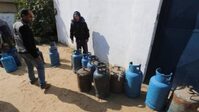15 mar 2020

Egyptian naval forces on Saturday evening arrested two Palestinian fishermen off the coast of Rafah area in the south of the besieged Gaza Strip.
According to the Fishermen Committees in Gaza, an Egyptian gunboat chased fishing boats off the coast of Rafah port before intercepting one of them and rounding up two fishermen.
Another fishing boat capsized and the fishing kit aboard it sank during the chase.
The detained fishermen were identified as Ra’fat and Tareq Qannan, residents of Khan Yunis in southern Gaza.
This was not the first time the Egyptian navy chased and arrested fishermen off the coast of Gaza. Some fishermen were reportedly exposed to physical assaults during their detention in previous similar incidents.
According to the Fishermen Committees in Gaza, an Egyptian gunboat chased fishing boats off the coast of Rafah port before intercepting one of them and rounding up two fishermen.
Another fishing boat capsized and the fishing kit aboard it sank during the chase.
The detained fishermen were identified as Ra’fat and Tareq Qannan, residents of Khan Yunis in southern Gaza.
This was not the first time the Egyptian navy chased and arrested fishermen off the coast of Gaza. Some fishermen were reportedly exposed to physical assaults during their detention in previous similar incidents.
15 feb 2020

The Egyptian armed forces have started to build a new concrete wall along its border with the Gaza Strip.
According to local residents in Rafah, Egyptian workers and cranes started on Friday to build and erect segments of the concrete wall.
The barrier will isolate Gaza from Egypt completely and will be built along the 14-kilometer-long border between the two sides, starting from the Karam Abu Salem border crossing in the east of the Rafah crossing to the Palestinian shore in the west of Gaza.
The wall, made of reinforced concrete, is six meters high and goes about five meters under the ground. The distance between it and the old Egyptian stone wall will be around 20 meters.
An Egyptian intelligence delegation accompanied by three engineers visited Gaza on February 10 and made a field trip along the Egyptian-Gazan border as part of new Egyptian preparations to boost border security.
According to local residents in Rafah, Egyptian workers and cranes started on Friday to build and erect segments of the concrete wall.
The barrier will isolate Gaza from Egypt completely and will be built along the 14-kilometer-long border between the two sides, starting from the Karam Abu Salem border crossing in the east of the Rafah crossing to the Palestinian shore in the west of Gaza.
The wall, made of reinforced concrete, is six meters high and goes about five meters under the ground. The distance between it and the old Egyptian stone wall will be around 20 meters.
An Egyptian intelligence delegation accompanied by three engineers visited Gaza on February 10 and made a field trip along the Egyptian-Gazan border as part of new Egyptian preparations to boost border security.
24 jan 2020

The severity of Gaza’s humanitarian crisis is currently growing in magnitude, as a result of Israel tightening its 15-year long, illegal siege of the poverty-stricken Palestinian territory.
Due to Israel’s restriction of gas, prevented from entering the besieged coastal enclave, the people of Gaza are facing a lack of sufficient heating, lighting, and the ability to properly deal with sewage, all this and more whilst their Arab neighbor, Egypt, is purchasing stolen Israeli gas.
Last February, Egypt signed a 19-billion-dollar gas deal with Israel. A few days ago, Israel officially began pumping that gas into Egypt via an ‘Eastern Mediterranean Gas’ pipeline formerly used to supply Israel with Egyptian gas (during the rule of ex-president of Egypt Hosni Mubarak).
Israel restricts the gas it is allowing into Gaza, collectively punishing the Palestinian people — which constitutes a crime against humanity — for what Israel decides is the illegitimate actions of Gaza’s democratically-elected government.
Egypt’s coup leader, Abdel Fattah el-Sisi, has not only sold the soul of Egypt by purchasing the Israeli occupying entity, but has also participated in enforcing Egypt’s side of the illegal blockade of Gaza. Sisi has continuously watched on as the two-million-strong population of the besieged Gaza Strip suffers untold misery.
Besides Egypt’s collaboration with Israel’s racist persecution of the Palestinian people in Gaza’s death camp is also the most shameful of deliberate targeting of Gaza’s food and resources by Israel itself.
The Palestinian Agricultural Ministry said in a statement on Sunday that Israel had purposely flooded and destroyed roughly 920 acres of farmlands in Eastern Jabalia and Beit Hanoun, Northern Gaza, causing 500,000 dollars worth of damage. On top of this, Israel has also begun spraying dangerous chemicals over farmland to the East of Khan Yunis and Rafah, located in the South of Gaza. The Gaza Strip has very scarce amounts of agricultural land and is already operating in a declared state of emergency, as of February 2018.
Adding to the list of Israeli crimes in Gaza is the fact that the Gaza gas fields, which were discovered in 1999 and belong to the Palestinian people under international law, still have not been excavated. The only reason for the Palestinians not being able to take advantage of their own oil is that Israel’s illegal blockade prohibits them from doing so, meaning that the people of Gaza are living in an area which has been deemed ‘unlivable’ by experts at the United Nations, suffering unimaginable pain, whilst literally sitting right next to a treasure trove of natural gas.
Approximately two weeks ago, Israel decided to cut off the main supply of gas from entering the Gaza Strip. Since then, Egypt has let in 10 trucks, which have entered the besieged territory, but according to Gaza’s residents, this simply has not been enough to supply the people with a sufficient source of gas. Khaled Tabasha, a Palestinian activist living in Gaza’s al-Bureij refugee camp, spoke to me, informing me that his family and many others living in his camp have not been able to cook properly. Khaled even said that things have gotten so bad that he and others have begun looking for wood, in order to start fires from which they can cook their food.
The term “sending Gaza back to the stone age” has been often used by Israeli politicians, referring to the military bombardments of the territory by Israel, but it seems by the blockade alone, Israel is achieving this aim.
In the Gaza Strip, a lack of gas not only means that Palestinians are having to resort to using wood fires to cook, it also affects motor vehicles, hospitals, and of course the heating inside houses. In addition to this, Gaza is again having an electricity crisis, which means that right now the people only have access to roughly four and a half hours of electricity per day. This is during a time where the climate is very cold in Gaza. To give an example of how cold Palestine has been lately, just yesterday, it snowed in al-Khalil (Hebron), located to the North of Gaza, in the West Bank.
Toxic Pesticides have also recently been sprayed along the separation fence, illegally built between Gaza and Israel. The spraying of these potentially lethal substances along the separation fence — a violation of international law — is justified by the Israelis as being a “security” precaution.
The question now remaining is: how long can Gaza continue to suffer as the conditions get more and more severe?
Due to Israel’s restriction of gas, prevented from entering the besieged coastal enclave, the people of Gaza are facing a lack of sufficient heating, lighting, and the ability to properly deal with sewage, all this and more whilst their Arab neighbor, Egypt, is purchasing stolen Israeli gas.
Last February, Egypt signed a 19-billion-dollar gas deal with Israel. A few days ago, Israel officially began pumping that gas into Egypt via an ‘Eastern Mediterranean Gas’ pipeline formerly used to supply Israel with Egyptian gas (during the rule of ex-president of Egypt Hosni Mubarak).
Israel restricts the gas it is allowing into Gaza, collectively punishing the Palestinian people — which constitutes a crime against humanity — for what Israel decides is the illegitimate actions of Gaza’s democratically-elected government.
Egypt’s coup leader, Abdel Fattah el-Sisi, has not only sold the soul of Egypt by purchasing the Israeli occupying entity, but has also participated in enforcing Egypt’s side of the illegal blockade of Gaza. Sisi has continuously watched on as the two-million-strong population of the besieged Gaza Strip suffers untold misery.
Besides Egypt’s collaboration with Israel’s racist persecution of the Palestinian people in Gaza’s death camp is also the most shameful of deliberate targeting of Gaza’s food and resources by Israel itself.
The Palestinian Agricultural Ministry said in a statement on Sunday that Israel had purposely flooded and destroyed roughly 920 acres of farmlands in Eastern Jabalia and Beit Hanoun, Northern Gaza, causing 500,000 dollars worth of damage. On top of this, Israel has also begun spraying dangerous chemicals over farmland to the East of Khan Yunis and Rafah, located in the South of Gaza. The Gaza Strip has very scarce amounts of agricultural land and is already operating in a declared state of emergency, as of February 2018.
Adding to the list of Israeli crimes in Gaza is the fact that the Gaza gas fields, which were discovered in 1999 and belong to the Palestinian people under international law, still have not been excavated. The only reason for the Palestinians not being able to take advantage of their own oil is that Israel’s illegal blockade prohibits them from doing so, meaning that the people of Gaza are living in an area which has been deemed ‘unlivable’ by experts at the United Nations, suffering unimaginable pain, whilst literally sitting right next to a treasure trove of natural gas.
Approximately two weeks ago, Israel decided to cut off the main supply of gas from entering the Gaza Strip. Since then, Egypt has let in 10 trucks, which have entered the besieged territory, but according to Gaza’s residents, this simply has not been enough to supply the people with a sufficient source of gas. Khaled Tabasha, a Palestinian activist living in Gaza’s al-Bureij refugee camp, spoke to me, informing me that his family and many others living in his camp have not been able to cook properly. Khaled even said that things have gotten so bad that he and others have begun looking for wood, in order to start fires from which they can cook their food.
The term “sending Gaza back to the stone age” has been often used by Israeli politicians, referring to the military bombardments of the territory by Israel, but it seems by the blockade alone, Israel is achieving this aim.
In the Gaza Strip, a lack of gas not only means that Palestinians are having to resort to using wood fires to cook, it also affects motor vehicles, hospitals, and of course the heating inside houses. In addition to this, Gaza is again having an electricity crisis, which means that right now the people only have access to roughly four and a half hours of electricity per day. This is during a time where the climate is very cold in Gaza. To give an example of how cold Palestine has been lately, just yesterday, it snowed in al-Khalil (Hebron), located to the North of Gaza, in the West Bank.
Toxic Pesticides have also recently been sprayed along the separation fence, illegally built between Gaza and Israel. The spraying of these potentially lethal substances along the separation fence — a violation of international law — is justified by the Israelis as being a “security” precaution.
The question now remaining is: how long can Gaza continue to suffer as the conditions get more and more severe?
